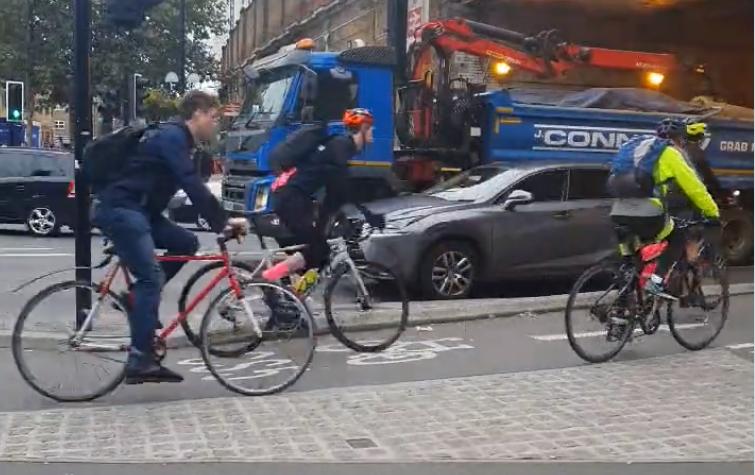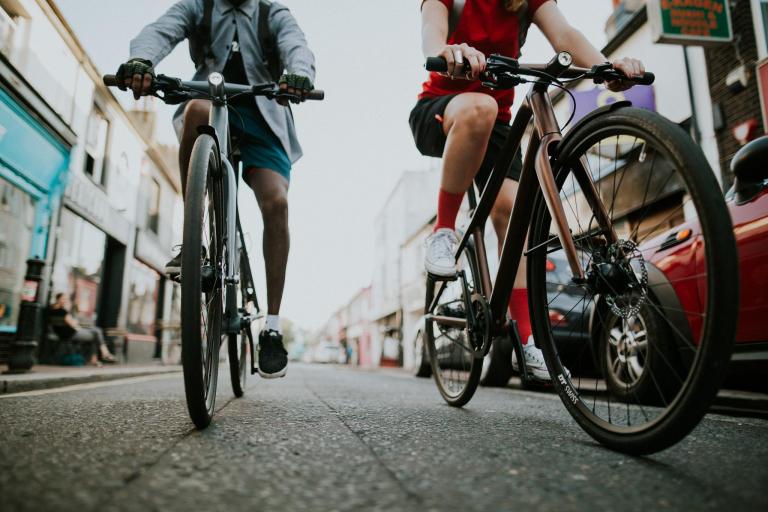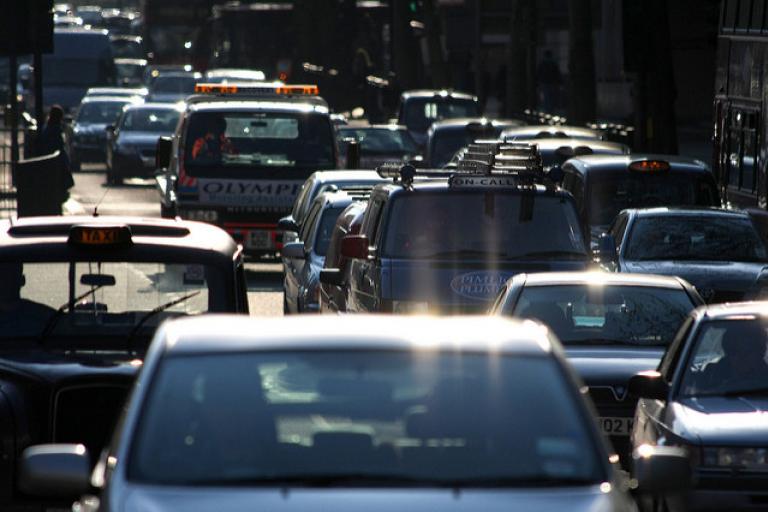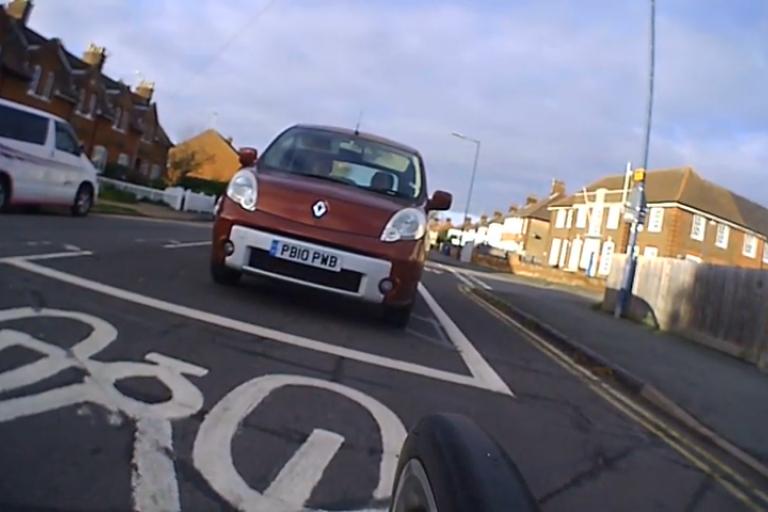- News
- Reviews
- Bikes
- Accessories
- Accessories - misc
- Computer mounts
- Bags
- Bar ends
- Bike bags & cases
- Bottle cages
- Bottles
- Cameras
- Car racks
- Child seats
- Computers
- Glasses
- GPS units
- Helmets
- Lights - front
- Lights - rear
- Lights - sets
- Locks
- Mirrors
- Mudguards
- Racks
- Pumps & CO2 inflators
- Puncture kits
- Reflectives
- Smart watches
- Stands and racks
- Trailers
- Clothing
- Components
- Bar tape & grips
- Bottom brackets
- Brake & gear cables
- Brake & STI levers
- Brake pads & spares
- Brakes
- Cassettes & freewheels
- Chains
- Chainsets & chainrings
- Derailleurs - front
- Derailleurs - rear
- Forks
- Gear levers & shifters
- Groupsets
- Handlebars & extensions
- Headsets
- Hubs
- Inner tubes
- Pedals
- Quick releases & skewers
- Saddles
- Seatposts
- Stems
- Wheels
- Tyres
- Health, fitness and nutrition
- Tools and workshop
- Miscellaneous
- Tubeless valves
- Buyers Guides
- Features
- Forum
- Recommends
- Podcast
news
London cyclists warned to be careful... because of all the car fumes; Barrister asked if he was wearing a helmet - after being hit by a motorist; Viaduct reopens for cyclists and walkers; Is cycling linked to your education? + more on the live blog
SUMMARY
No Live Blog item found.
 CS5 cyclists (screenshot via London Cycles video Twitter)
CS5 cyclists (screenshot via London Cycles video Twitter)14 January 2022, 17:50
Heading into the weekend like…
He like cycling pic.twitter.com/0KW9iQmZjr
— Aww! (@worldofaww) January 10, 2022
That’s it for the week folks! Thanks for keeping me company on the blog.
I don’t know about you, but I’m away for a lie-down. I was on the receiving end of a heavy tackle at five-a-sides last night, and my ribs have been sore ever since.
If only I’d been wearing my helmet…
14 January 2022, 17:06

Ovo Bikes return to Cardiff after two month break due to thefts and vandalism
The Ovo bike hire scheme was reintroduced to Cardiff and the Vale of Glamorgan yesterday, two months after the scheme was suspended due to a high number of thefts and vandalism.
Before the suspension of the scheme in November, 300 Ovo bikes had been stolen and 260 vandalised. It was the first time operator Nextbike had been forced to withdraw its services in the UK.
Nextbike’s Krysia Solheim told Wales Online: “It’s a relief to be back on the streets of Cardiff and the Vale of Glamorgan. We know our customers have missed having access to the Ovo Bikes schemes.
"Bike share is a fantastic, affordable, and healthy way to move around our towns and cities – not to mention the fact that it’s one of the best ways of reducing harmful transport emissions.”
Let’s just hope it goes better this time…
14 January 2022, 17:10
14 January 2022, 16:55
CPA threatens to sue The Cyclists’ Alliance over ‘fake news’ prize money concerns
⚠️ #Fakenews alert: to protect the riders we cannot lie to them! #CPA responds to defamation of The Cyclists' Alliance about the Centralized #PrizeMoney Management System 🚴♀️ https://t.co/hF91HtSM63#CPAwomen #WeAreTheRiders #StrongerTogether #Cycling #WomenCycling pic.twitter.com/2GHXa5DYlE
— CPA Women (@women_cpa) January 13, 2022
The pro season hasn’t even started in earnest yet and there’s already been some serious inter-organisational conflict (remember the ASO-UCI wars of the mid-noughties and mid-2010s? Surely another one of those is scheduled soon…).
This time, the Cyclistes Professionnels Associés (CPA to you and me) has threatened to sue The Cyclists’ Alliance (TCA) for what it described as defamation and false information after the TCA published concerns surrounding the administration of prize money on the women’s side of the sport.
Often criticised for its cosy relationship with the UCI, the CPA is the officially recognised riders’ representative organisation. Headed on the men’s side by Gianni Bugno, a women’s branch was finally set up in 2017.
While the CPA Women is made up of national riders’ associations, the TCA on the other hand operates a ‘one rider, one vote’ system. Also established in 2017 by ex-pro Iris Slappendel, the TCA has been praised for its close work with riders concerning contracts, retirement, career advice and education, and is viewed by many as the ‘true union’ for women’s cycling.
Surely, I hear you cry, the two organisations would work together to secure the continuing development of the women’s sport? Ah, but not so fast. It’s Friday afternoon so I’ll spare you the details, but this month the UCI’s Centralised Prize Money Management system (operating on the men’s side since 2017) was introduced for women. In this system, deductions are taken from prize money at races to pay for costs including doping controls, retirement funds and the development of national riders’ associations.
This week the TCA released a statement, claiming that the riders – who the TCA says the prize money “belongs to” – were not consulted about the scheme. The statement asked a series of pertinent questions about the new system and called for an independent third party to be involved, preventing a monopoly over the administration of cycling’s prize money.
The CPA has since responded in a confrontational press release, accusing the TCA “of defaming the CPA and manipulating the riders.”
“The TCA not only appears to be ill-informed but manifests superficiality in its communications,” the statement read. “The riders are enthusiastic about how CPM works. With this transparent system no prize money is lost and riders are paid faster. Alessandra Cappellotto and CPA Women are doing important work in partnership with the UCI and other stakeholders to ensure that the gap between women and men is gradually reduced.”
The accusatory and hostile tone of the CPA’s response has been widely criticised throughout the sport. TCA representative and world time trial champion Ellen van Dijk tweeted the following:
Dear @women_cpa, I don’t think this is the best way to contact, but I feel like I need to react to your 🚨
As riders, we asked @Cyclists_All to ask questions as we need transparency around the prize money platform. All we need is answers instead of a threatening statement 🙏 https://t.co/EygTBCqNzq— Ellen van Dijk (@ellenvdijk) January 14, 2022
It is clear that both organisations are committed to growing women’s cycling, probably the most important issue in the sport right now. Disputes like this only do the opposite.
14 January 2022, 15:56
14 January 2022, 15:41
Sherlock Holmes and the case of the not-so-genius bike thief
Well that’s one way to get caught stealing a bike…
The thief was tracked down after he had provided his personal details when selling the stolen bike: https://t.co/MsL3kilxhk
— Ellesmere Port & Neston Standard (@EPortStandard) January 11, 2022
14 January 2022, 15:24
Cycling UK shares new Cyclists’ Defence Fund video as it aims to reinstate popular bike lane
We are currently challenging a council's decision to remove a popular cycle lane. And with your support, we'll stop this happening across the UK in future.
Donate to Cycling UK's Cyclists' Defence Fund today and help us be ready for tomorrow's battles: https://t.co/3sJuCtSTxx pic.twitter.com/Orki7qqkVY
— Cycling UK (@WeAreCyclingUK) January 14, 2022
This morning the bike charity Cycling UK shared a new fundraising video for their Cyclists’ Defence Fund (CDF). The CDF helps fight legal cases involving individual cyclists and cycling in general, especially those which could set important safety-related precedents.
The film includes examples of some of the cases fought using the CDF in the past, as well as Cycling UK’s current legal challenge against West Sussex County Council’s decision to remove a popular cycle lane on the Old Shoreham Road, used by children to get to school.
Cycling UK’s Sam Jones told road.cc that through this challenge, which was made possible by donations to the CDF, they hope to “set a precedent and make other councils take note before doing similar.”
Today’s fundraising call, Jones says, is “about helping us to prepare for tomorrow’s battles.” You can donate to the Cyclists’ Defence Fund on Cycling UK’s website.
14 January 2022, 14:31
National Champs kits done right
Joonas Henttala & 🇫🇮 RR Nat Champ kit. (📷 Novo Nordisk) pic.twitter.com/8EDZS8ajhp
— ammattipyöräily (@ammattipyoraily) January 14, 2022
There’s been a lot of talk over the silly season about poorly designed national champions’ jerseys (looking at you, UAE). So it’s refreshing when you come across one that ticks all the boxes, courtesy of Finnish champion Joonas Henttala and Team Novo Nordisk.
14 January 2022, 13:27
Tussling with the Tinker Man
Following Cycling Mikey’s alleged altercation with a texting motorist, covered yesterday on the blog, more London cyclists have come forward with reports of their own run-ins with phone-wielding drivers:
The phone-using driver of this BMW X5 SUV pulled out in front of me on Kings Road, Chelsea on xmas eve. After politely challenging him, he punched me on the head with his hand, verbal abuse and as I was cycling away deliberately rammed me off the road. Driver arrested by Met. /1 pic.twitter.com/VL2ooYQYdH
— Nathan (@NathanP3333) January 14, 2022
Nathan’s story led another Twitter user to recall one particularly harrowing experience on the same road with a certain maverick Italian football manager:
Can't punch you with anything else. Claudio Ranieri nearly ran me over on Kings Road once. I stay away these days!
— Paul Cave (@CaveyYNWA) January 14, 2022
Going by the location, I assume this incident took place when Ranieri was in charge of Chelsea. Maybe the Tinker Man was too busy contemplating whether he should drop Damien Duff or not… Or perhaps he was texting his No. 8 to get him a coffee?
14 January 2022, 12:58

“Roses are red, violets are blue, forget Valentines, I want Di2…”
Great news - we’re exactly one month away from the stupidest day of the year!
But have no fear, as you can make the guilt-infested capitalist showpiece that is Valentine’s Day slightly more palatable with these rather brilliant ‘honest’ cycling-themed cards from Band of Climbers.
Although if you were really being honest with yourself, you would just go on your planned spin anyway and leave all of the unnecessary obligation to Hallmark. Have I made it clear how much I dislike Valentine’s Day?
14 January 2022, 12:25

Are university graduates more likely to cycle to work?
A newly published study in the Journal of Transport Geography has claimed that people with a university degree are far more likely to cycle for transportation than other city dwellers.
The research, undertaken by Dr Ansgar Hudde at the University of Cologne, examined the socio-economic status of people who cycle to work, analysing over 800,000 journeys by 55,000 people between 1996 and 2018.
He found that, irrespective of age, gender and even location, individuals with college degrees were 50% more likely to ride bikes.
Dr Hudde’s study builds on earlier research which has shown that people choose their transport method based on travel time, cost, and its symbolic value – in essence, how others will perceive it.
Traditionally, this has been linked to motorists who buy large, expensive cars to signal their socio-economic standing - I'm sure we've all heard the old 'cyclist saving up to buy a car' joke - while also (perhaps unconsciously) pointing out that they don’t care that much about the environment.
“With the bicycle, it’s exactly the opposite,” Hudde claims.
“People with higher educational qualifications usually do not run the risk of being perceived as poor or professionally unsuccessful, even if they are on the road with an inexpensive bike. Rather, they can gain status by cycling.”
Riding a bike, according to the study, can also mark out an individual as “modern, health-conscious, and environmentally aware. In contrast, people with a lower level of education might be more likely to use an expensive car as a status symbol to show that they have ‘made it.’”
The growth in bike usage, Hudde argues, is therefore linked to rising education levels.
However, he believes that more should be done to encourage a wider demographic to cycle, and that the increase in cycling infrastructure in cities could actually exacerbate social inequality.
“We need targeted policies that reach those who stand aside from the current bike boom: people outside the bigger cities and with less education.”
So what do you think? Is bike riding as a mode of transport a status symbol intrinsically linked to your education?
14 January 2022, 11:29
14 January 2022, 11:22

“Iron Giant” reopens for cyclists and walkers
A Victorian viaduct, derelict for over half a century, has been reopened for cyclists and walkers.
Bennerley Viaduct originally opened in 1877 and runs between Derbyshire and Nottinghamshire. It was closed due to railway cuts in 1968.
Despite several attempts by British Rail to demolish the “Iron Giant” – the only UK structure on the 2020 World Monuments Watch list – repairs to the viaduct have been under way since 1986.
We are open for business! The wait is over. After 54 years of closure, David Pemberton, director of Railway Paths (in orange) announces the works are complete. The Railway Heritage Trust (RHT) funded £560k of the Bennerley Viaduct project which has cost £1.7m. https://t.co/K8LlFvBnmn
— Bennerley Viaduct (@TheIronGiant_) January 12, 2022
While there were initial concerns over what the bridge would be used for, it was finally decided that a cycling and walking route would be installed.
The newly revamped Bennerley Viaduct was officially reopened yesterday, with Andy Savage from the Railway Heritage Trust the first person to cycle across it.
14 January 2022, 10:35
“Were you wearing a helmet?”
So, I was knocked off my bike on Sunday morning by a car driver turning right. He told the police he was very sorry but had the sun in his eyes. Police told my wife it was an unfortunate accident….1/n
— Martin Porter QC (@MartinPorter6) January 13, 2022
Yesterday on the live blog we featured another example of the kind of standard-fare, pointless cycling safety question posited by backbench MPs with the sole aim of shifting the onus of road safety on to the most vulnerable users.
Now, as the last week, or month, or years have shown, politicians may not feel that their opinions, attitudes, or indeed their actions have any real-life consequences. But judging by the experiences of barrister Martin Porter this week, after he was knocked off his bike by a motorist, some perceptions of cycling safety appear to align with those of the Honourable Member for Bosworth.
On Sunday Porter, who used to blog under the moniker ‘The Cycling Lawyer’, was hit by a motorist who was turning right and claimed the sun was in his eyes. Porter suffered two broken ribs and damage to his teeth.
What followed was a series of incidents which seem to underline the place of cycling and cyclists when it comes to road safety.
According to Porter, the police told his wife it was “an unfortunate accident”, and every clinician and dentist treating him inquired whether he was wearing a helmet.
Most tellingly, when Porter informed the hospital physiotherapist that he had broken his ribs before while out cycling, she apparently replied “and the moral is?” Blimey.
Of course, this is an isolated incident and certainly cannot be said to reflect general public opinion. But it does once again highlight the level of miscalculation in Transport for London’s controversial ‘See Their Side’ advert. Empathy, eh?
14 January 2022, 09:48

Cyclists told to avoid London today… because of all the vehicle pollution
Londoners have been advised to avoid strenuous physical activity in the city today due to extremely high levels of pollution.
According to the government’s forecast pollution levels will reach band 10 on the Air Quality Index, the highest level on the scale.
A combination of light winds and an intense area of high pressure currently covering western Europe has resulted in a lack of air movement across the city, which means emissions from motor vehicles and other pollutants will linger in the air for longer and won’t be as easily blown away.
Older people and those with heart or lung problems have been warned not to undertake strenuous physical activity, while even healthy people should “reduce physical exertion, particularly outdoors, especially if you experience symptoms such as a cough or sore throat”.
So who will suffer the most from these extremely high levels of pollution caused by massive car congestion? That’s right, cyclists.
Cycling commentator and writer Ned Boulting summed up the paradox at the heart of the government’s advice:
Told by the authorities to be careful today when I have to cycle into town for a meeting. This is because of the pollution from motor vehicles. If you are driving today in London, please consider whether you have any alternatives.
— Ned Boulting (@nedboulting) January 14, 2022
I really have no idea. I guess they think I should drive?
— Ned Boulting (@nedboulting) January 14, 2022
In effect, the government’s advice seems to boil down to: “Maybe best not to cycle into work today because of all the car fumes. Could you drive instead?”
The Guardian’s Peter Walker had another solution:
For avoidance of doubt, I'm not *actually* advocating this, but in a more just world, on days like this, the 2/3 of people in my borough without cars should be allowed the physical activity of building permeable barriers on their streets and tossing the keys to SUVs down drains. pic.twitter.com/eJO55UT2p0
— Peter Walker (@peterwalker99) January 14, 2022
This week London’s mayor Sadiq Khan said car use in the city had almost returned to pre-pandemic levels and that “if we do not double down on our efforts to deliver a greener, more sustainable future, we will replace one public health crisis with another – caused by filthy air and gridlocked roads.”
Simon Birkett, Founder and Director of Clean Air in London, was even more blunt: "Londoners are literally stewing in their own juice with our own fumes trapped in still air for days. It is a stark reminder of how much we need to reduce building emissions as well as traffic emissions. Please do not burn wood on Friday!"
After obtaining a PhD, lecturing, and hosting a history podcast at Queen’s University Belfast, Ryan joined road.cc in December 2021 and since then has kept the site’s readers and listeners informed and enthralled (well at least occasionally) on news, the live blog, and the road.cc Podcast. After boarding a wrong bus at the world championships and ruining a good pair of jeans at the cyclocross, he now serves as road.cc’s senior news writer. Before his foray into cycling journalism, he wallowed in the equally pitiless world of academia, where he wrote a book about Victorian politics and droned on about cycling and bikes to classes of bored students (while taking every chance he could get to talk about cycling in print or on the radio). He can be found riding his bike very slowly around the narrow, scenic country lanes of Co. Down.
Add new comment
147 comments

OnYerBike
|
2 years ago
4 likes
RE bikes + grads:
Another plausible argument is that many people start cycling for transport as students. It's a prime opportunity for it - students tend to live in urban areas, be young and healthy, often unable to afford a car (or at least unwilling to justify the expense).
Once that habitat has developed, they are more likely to continue after graduating - they already have a functional bike, have become comfortable riding on roads, and appreciate the benefits of cycling.

I'd go with the correlation is not causation reason personally
Exactly.
Lots of things associated with personal health and concern for the environment are positively correlated with higher education, from vegetarianism to not smoking. Cycling is just another one of them.
Cycling has become bigger amongst middle class middle aged people who are quite likely to also be grads though my cycling club friends are a fair mix both ways. Think it is just a rising trend rather than the cause being grads per se. It was kick started in 2012 too by the Olympics/TdF.
RE bikes + grads:
Another plausible argument is that many people start cycling for transport as students.
Haven't you seen the number of students at uni with cars these days??
Back when I was a scruffy, penniless undergrad quite many of us felt that you weren't getting the full student experience if your parents paid for you to run a car while at college.
And IME a significant number of graduates didn't take up well paid employment but ended up in low paid prole jobs (self included). Even in the early 1990s a uni or poly honours degree didn't get you very far. It seems valued even less now, partly due to the huge growth in the sheer number of people who have obtained one during the last 2 decades.
But perhaps things are different in the German employment market.
“Individuals with a college degree are nearly 50% more likely to use bicycles than those without a college degree, holding factors such as age, gender, and place of residence constant in the analysis,”
But is the term "use" meaning pedalling a city bike for utility purposes such as a commute or does it mean riding as a leisure pursuit with other lycra-clad types on carbon steeds? Or both? The more I think about it the more intriguing it becomes... perhaps that's my very distant social science background.

Why are we not allowed to comment on the story involving the famous footballer with the intials FL?
I know right?
I was going to put some pithy comment about footballers and link to this article about Glen Whelan escaping a driving ban so that he can drive to get to games and training:
(Maybe that's the kind of loophole that Grant Shapps will close once he's dealt with all the statue loopholes that aren't at all loopholes)




visionset
|
2 years ago
12 likes
Went over it yesterday. I think the long term plan is to link Bennerley viaduct into sustrans 672 that is open and heavily used in to Derby via Breadsall. The remaining section is a corridor od disused railway near West Hallam. I think a fair bit will need to be bought back from landowners. So some significant hurdles.

Went over it yesterday. I think the long term plan is to link Bennerley viaduct into sustrans 672 that is open and heavily used in to Derby via Breadsall. The remaining section is a corridor od disused railway near West Hallam. I think a fair bit will need to be bought back from landowners. So some significant hurdles.
Need to get rid of that big yellow blob. Can't see a thing..


Genuine question, but do we know if some sort of railing is going to be erected on top of the wooden sleepers? From the photos I have seen it looks like it would be a very painful crash onto the tops of exposed metal beams if you were to lose your balance an trip over the sleepers. I can't be the only person to look at these pictures and see the potential crashes! Imagine riding along there, even at a moderate pace and then falling to the side. Broken limbs look very possible.


OldRidgeback
|
2 years ago
3 likes
I did go for my usual run with my dog here in S London this morning. I wasn't sure whether to do so as I'd seen the warnings. The air didn't seem too bad when I went out but after a while I did note a slight metallic taste in my mouth. There were plenty of others out running and cycling and my wife cycled to her work in the centre of town this morning too. I was intending to go to the bmx track for a lunch time ride but I think I'll skip that now. The air isn't as bad as it has been on previous occasions but that metallic taste in my mouth definitely wasn't a good sign.
I did go for my usual run with my dog here in S London this morning. I wasn't sure whether to do so as I'd seen the warnings. The air didn't seem too bad when I went out but after a while I did note a slight metallic taste in my mouth. There were plenty of others out running and cycling and my wife cycled to her work in the centre of town this morning too. I was intending to go to the bmx track for a lunch time ride but I think I'll skip that now. The air isn't as bad as it has been on previous occasions but that metallic taste in my mouth definitely wasn't a good sign.
Did you walk into a bar?

Was Martin wearing a helmet?
Do they help with broken ribs ?
Yes. the idea is to prevent people asking stupid questions, thus reducing the risk of popping ribs when you laugh derisively at them
Not that, as with the prevention of concussive head injuries, I'm making any guarantee that it actually works.....

You get asked if you're Covid vaccinated if you call an ambulance, you're rightly mocked by the general public if not. Why shouldn't cyclists not be similarly mocked if they don't wear a helmet which will very likely save their life one day.
if I hit my head skiing and don't have a helmet on my travel insurance doesn't cover me. It's law on my motorcycle. Why not when you put the Lycra on?

You get asked if you're Covid vaccinated if you call an ambulance, you're rightly mocked by the general public if not. Why shouldn't cyclists not be similarly mocked if they don't wear a helmet which will very likely save their life one day.
if I hit my head skiing and don't have a helmet on my travel insurance doesn't cover me. It's law on my motorcycle. Why not when you put the Lycra on?
again failing to seperate sport from transport.
Racing - helmets - club rides - helmets. riding off riad - helmets. Popping to the shops? shouldn't be necesary.
If people are skiing on the flat for one mile between home and the shops, do they still need a helmet? Or are we really talking about downhill skiing, which is more equivalent to racing

again failing to seperate sport from transport.
Racing - helmets - club rides - helmets. riding off riad - helmets. Popping to the shops? shouldn't be necesary.
The death rate of professional cyclists doesn't seem to have fallen since they were forced to wear helmets, but the figures are too small to be certain, so they don't seem to work for them either.
Hardly surprising since risk compensation is going to affect them just as it affects anyone using "safety" gear, and the level of protection afforded is much less than most people assume.
Pages
Latest Comments
- johnsonmoog 5 min 45 sec ago
So, if Jamie needs 1000mg of sodium an hour, how many hydration tabs or elctrolyte mix does he need. I see SIS a hydration tab provides 798mg of...
- S.E. 16 min 35 sec ago
My guess is that they sell mainly on the German market - feel free to correct me. That might explain why they are not "pushing" their products,...
- ktache 41 min 30 sec ago
Now Emily Chappell really liked the Lezyne , I have the HV version, good, but I find the handle uncomfortable in use. I've often wondered about the...
- biking59boomer 50 min 25 sec ago
What about this one!?
- Muddy Ford 51 min 48 sec ago
Charlie Alliston got 18mths and is the reference case (because there are so few cases) for all campaigns by anti-cyclists that 'cyclists are not...
- belugabob 1 hour 53 min ago
My local football practice pitches (all weather, in a fenced off area, are regularly the scene of inconsiderate parking, with vehicles blocking the...
- chrisonabike 2 hours 10 min ago
Don't forget though "Englishman's home is his castle" - which includes my rights to grow a giant curtain wall of Leylandii to "protect my privacy"....
- Spangly Shiny 2 hours 18 min ago
Assos ASOS anyone?
- chrisonabike 2 hours 31 min ago
Replace them all with Bromptons and they'd take up zero space within days or even hours, as they are all relocated elsewhere. To eBay or possibly...
- Andrewbanshee 3 hours 2 min ago
Where I live we are experiencing a lot of housing development on small and large plots of land. These developers don't seem to have problems...



